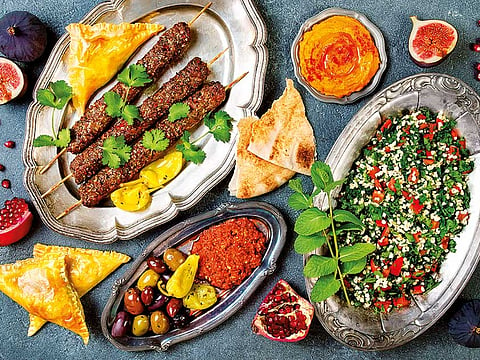Don’t overindulge during Eid
After a month of devotion and restraint in Ramadan, it’s easy to go overboard with the delicious treats when Eid Al Fitr arrives. Better Health asks experts how to avoid piling on the pounds during the festivities

This year’s Ramadan takes place right in the middle of soaring UAE temperatures, meaning even more willpower and planning than usual are needed to get through the holy month healthy and fulfilled.
And now Eid Al Fitr is on horizon, promising days of celebration, socialising with friends and family and of course table loads of glorious food.
Simple steps
Unfortunately, this can also be the time when people reverse all the bodily benefits that occurred over Ramadan — particularly the shedding of unwanted flab. But it doesn’t have to be that way, say experts, if you follow some simple guidelines.
“Even if you were able to fast healthily throughout Ramadan, you should allow your body time to adjust during Eid as the intake of large portions can lead to an upset stomach, indigestion and bloating,” says Dr Ruchika Mukherjee, Associate Medical Director at global health firm Cigna.
“One of the most common ailments due to overeating in Eid is abdominal pain. This occurs when there is a large intake of carbohydrates. It is important for people to be aware of what they put on their plate, as overindulging can cause intestinal disorders that can worsen existing health conditions.
“Make sure you manage your salt intake too and avoid fried, oily or greasy food. Go for a balanced meal instead, comprising equal quantities of proteins and vegetables with a small proportion of carbohydrates. Ideally, your dinner plate should comprise half a portion of vegetables, a quarter portion of proteins and quarter portion of carbohydrates. It is important to concentrate on the quality of food as much as the quantity, consuming from all food groups, and to remain physically active.”
Diabetics should ensure they don’t eat too much sweet. Medical emergencies due to high blood sugar levels are frequent in the days following Eid. The risk is higher for those who have type 1 diabetes.
Coming back to your routine gradually is the key to success seems to be the consensus, as reverting to pre-Ramadan habits could be a big shock for your body. Worse than that, a very common mistake people make during Eid is eating even more than they used to eat before Ramadan.
Take it slow
Banin Shahine, Resident Nutrition Expert at Fitness First, recommends getting things under control straightaway by starting Eid with a filling but healthy breakfast. “This will help you to control your food intake later on, boost your energy and control your appetite,” she explains.
Shahine also suggests eating small amounts of healthy foods throughout the day. “This sends a signal to your brain that the food supply is plentiful, so it’s okay to burn through those calories quickly.
“Limiting your calorie load at a single sitting also gives you lots of energy. Eating too many calories in one meal — even if they’re healthy calories — sends your brain the message that leaner times must be around the corner, so those calories will get stored as fat. Eating too much in one sitting can also make you sluggish and sleepy.
“Eating the right amount of complete protein for your weight and activity level stabilises blood sugar — which prevents energy lags — enhances concentration and keeps you lean and strong. A complete protein is any animal and dairy product or a grain plus a legume, especially when you feel you need a good meal that supports your body and helps you feel full for longer time.
“Another thing to watch out for is that during Eid gatherings you will probably be offered a lot of tea and coffee, which leads to too much caffeine, thus increasing the stress levels in the body and disturbing your sleep, which is especially bad news if you want to go back to your pre-Ramadan sleeping routine.”
One of the biggest, and most tempting, aspects of Eid that can cause those calorie counts to soar is the range of fatty sugary sweets on offer. These can increase insulin levels making you feel tired and sleepy, as well as increase weight rapidly. Nutritionists advise trying to limit Eid sweets and substitute them with your favourite fresh or dried fruits.
Pre-preparation for Eid is key too. “When you’re busy with friends and family, you do not have access to food at regular intervals,” says Shahine. “Or worse, you tend to skip meals so you can have that sticky sweet and fatty traditional Eid dessert.
“The problem is the body will stay in the starvation mode it was in during Ramadan and will not boost your metabolism. To keep your mind and body humming, pack healthy snacks and share them with your family and friends when you see them. Good examples are almonds, raw vegetables and hummus, yogurt and berries, fresh and dried fruit, and hard-boiled eggs.”
While technically not a food, water is one of the most essential components of our diet, and drinking lots of it through Eid will help greatly, says Freda Molamphy, Spinneys Dubai’s health and nutrition expert. “Water is incredibly necessary for all processes in the body,” she explains. “Once Eid arrives start a full re-hydration process by drinking diluted fruit and vegetable juices and plenty of plain water throughout the day. Drink a little a very often rather than large quantities as this allows the kidneys to function more efficiently and aids fluid absorption.
“Steer clear of tea, coffee and colas as much as you can as these are diuretic and contribute to fluid loss, which should be avoided.”
Sign up for the Daily Briefing
Get the latest news and updates straight to your inbox



